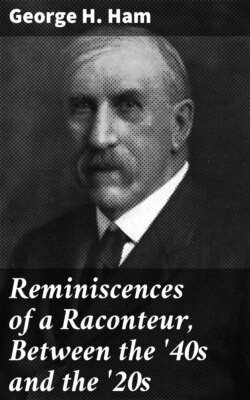Читать книгу Reminiscences of a Raconteur, Between the '40s and the '20s - George H. Ham - Страница 13
На сайте Литреса книга снята с продажи.
I Own a Race Horse
ОглавлениеTable of Contents
Whitby in the early days was also a great horse-racing centre. There was a mile track up near Lynde’s Creek, which attracted large numbers of sports from all parts of the country—but the number of non-paying spectators, who drove into town and hitched their wagons just outside the fence, was also very large. Nat Ray, and the Ray boys of Whitby, were the leading local sports, and Quimby and Forbes, of Woodstock, were the pool sellers, and such men as Joe Grand, Bob Davies, and Dr. Andrew Smith, Toronto; John White, M.P. for Halton; Roddy Pringle of Cobourg; W. A. Bookless of Guelph, and Gus Thomas of Toronto, were regular attendants. Purses of $400 downwards, big sums in those days, were offered. Black Tom, Charlie Stewart, Lulu, Storm, Jack the Barber, were amongst the horses that ran. Black Tom—Nat Ray’s horse—could trot in 2.40, which was then a good record. Storm—oh, well Storm—it was an appropriately named horse. It was raffled and Jack Stanton—Jack was starter for years at the Ontario Jockey Club in Toronto, and was as good a sport as ever lived—and a couple of other fellows and I had the good or bad fortune to win it. Storm was contrary as a petulant maid, and when we had no money on her would win hands down, and when we bet our last nickel—good-bye to our money. I lost all my little money on Storm, and willingly gave Jack Stanton my share in the contrary horse. If I remember aright, he came out about even. Jack always smoked a certain grade of cigars, which then sold at five cents, and thought they were the best in the land. In after years, when I had recuperated financially, I would bring him up some special Havanas, which cost twenty-five cents, and give him one, just to see him light it, and, while I wasn’t looking, throw it away in disgust, and light one of his own ropes, which he really enjoyed. How I delighted in Jack telling me that the cigar was a fine one, he presuming that I would think he meant the twenty-five-cent cigar, and I knowing he was referring to his nickel nicotine.
Then the sports in town for the races played poker at night at the office of Nat Ray’s livery stable. The first night I played, and in the first hand, I had a pair of deuces, and so green was I that when Charlie Boyle made a raise of $5.00 I senselessly stayed, drew three cards and with the luck of a greenhorn pulled in the two other deuces. Charlie filled his two pair, and had a full house. He bet $5.00 and I, thinking I had two pair, and not knowing their value raised him $5.00. Finally he called and threw down his ace full. I said I had two pair and when I showed the two pair—of deuces—there was a general hilarity; Charlie said he had never in his life ran up against a greenhorn who didn’t beat him. I didn’t know that my two-pair were fours. I cleaned up $65.00 that night and thought, as all greenies do, that I knew all about poker. I learned differently in the following nights.
In 1870, the Queen’s Plate was the great event of the meeting. That was when Charlie Gates’ Jack Bell won. There was a big field, and Charlie’s horse was in it—one of the rank outsiders. Terror was a prime favorite. Charlie always liked the younger generation, and when I asked him what horse to bet on, he said any one but Jack Bell. Such is the perversity of youth that I immediately placed my money on Jack. The favorite led for the first mile, but in the next quarter was passed by Jack on the Green and another horse and Jack Bell closed upon the leaders, and coming down the home stretch forged ahead and won by nearly a length. Terror was fifth, and I was again a capitalist. All the winnings were usually made by such amateurs as myself, and it wasn’t because of our good judgment or experience, but just on luck. That was one of the memorable races of the early days, and is not forgotten to this day by a lot of old-timers.
